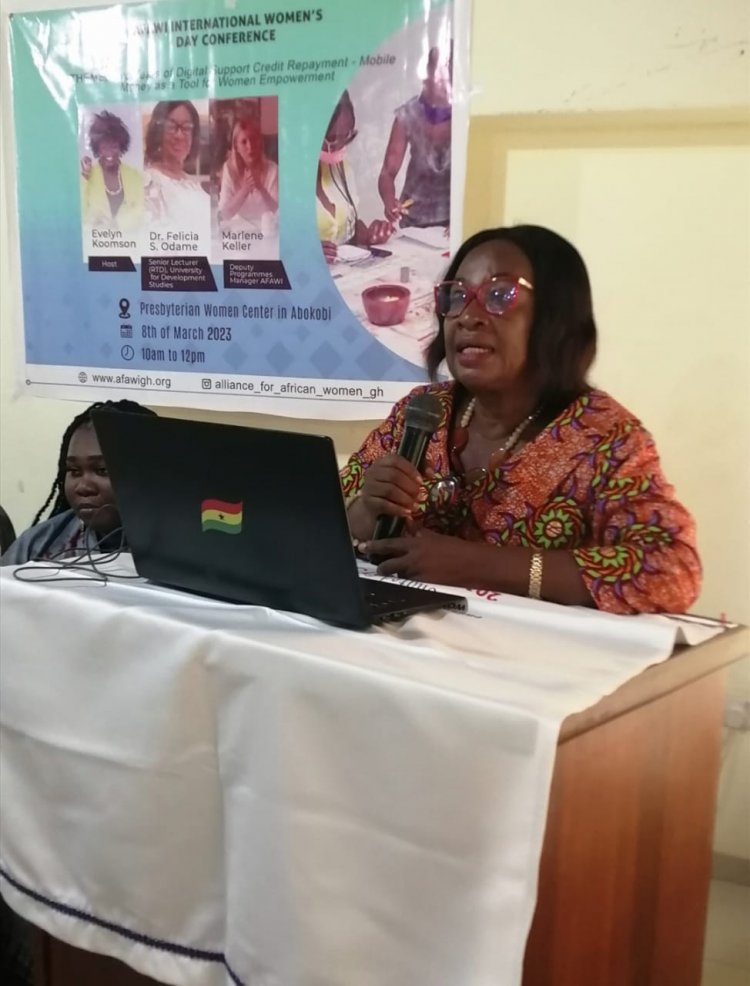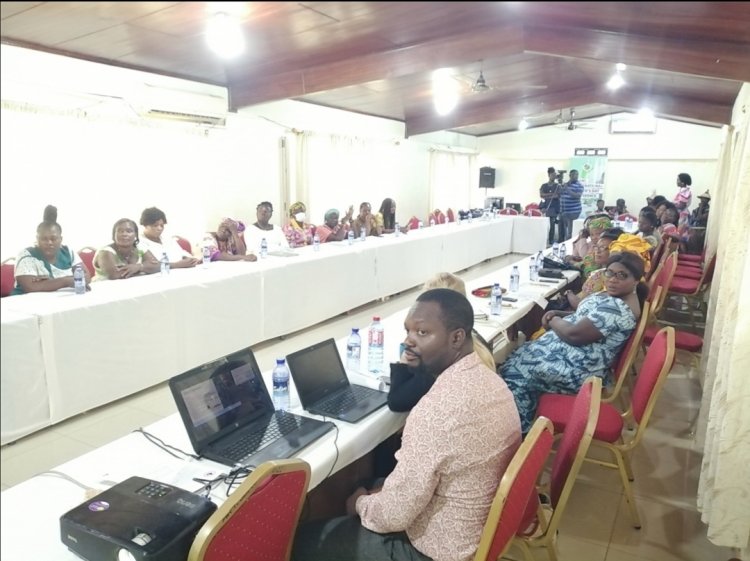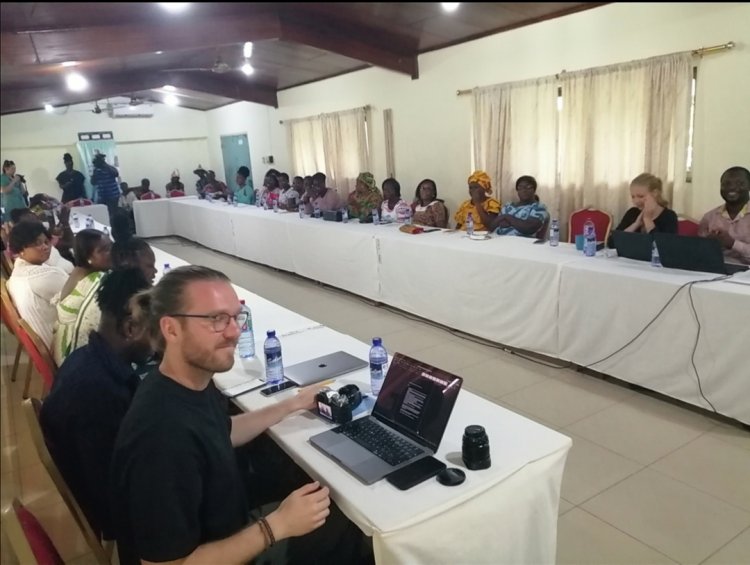Keep upgrading yourselves to ensure parity with men-women told
Dr Felicia Odame has charged Ghanaian women to always endeavour to upgrade themselves in every field of life so as to be well positioned towards realization of bridging the gender inequality gap agenda.

Board Director of the Alliance For African Women Initiative (AFAWI), a non-profit organization, Dr. Felicia Odame has charged Ghanaian women to always endeavor to upgrade themselves in every field of life to be well positioned towards the realization of bridging the gender inequality gap agenda. According to her, it is never too late for women to achieve gender parity only if they work hard, innovate and focus on building up themselves socially, economically, politically, and psychologically through constant education. “Dear women, it is never too late to make it, therefore.

you should always be up and doing and make sure you do something for yourselves to be self-reliant”. “You should always strive to upgrade yourselves and come to the level of men because ideas and knowledge are not only for men. It’s for both men and women, so the little you know is not enough therefore you should keep upgrading yourselves until one day we get to realize that the gender inequality gap is closed in Ghana where women can be at par with the men”. Dr. Felicia Odame made this known while addressing a gathering of grassroots women entrepreneurs at an event to mark this year’s International Women’s Day on Wednesday, March 8, 2023, held at Abokobi in Accra. The event was organized by AFAWI on the theme: “Celebrating five years of success using digital loan repayment: Mobile money as a tool for women empowerment”.

It brought together over fifty (50) small-scale female entrepreneurs including petty traders, head porters, seamstresses, beauticians, and hairdressers among others from the Greater Accra, Volta, and the Western North Regions of Ghana. The beneficiaries were schooled on the significance of the International Women’s Day celebration including some important topics such as gender inequality, women empowerment, digital technology, how they can harness the power of digital technology to boost their businesses and the need to be innovative to remain relevant and self-sufficient. In her presentation on the topic “DigitALL: Innovation and technology for gender equality”, Dr. Felicia Odame advised the beneficiaries to pursue their own goals, live according to their values, and develop self-reliance so they can be well-positioned to make choices and influence decisions both individually and collectively in their various communities. She also encouraged women to embrace digital technology, harness the power of mobile money and make judicious use of the various social media platforms available as major tools to promote their businesses. “Don’t forget to utilize your mobile phones to help create public awareness about your goods and services. You can always promote them on YouTube, Facebook, and your WhatsApp statuses and people will contact you to buy them”, she told them. Some of the beneficiaries during an open forum shared their experiences on the benefits derived from the digital technology tools (mobile money and WhatsApp platforms) they have been introduced to under the AFAWI Livelihood Project which improved their businesses as well as facilitated the loan repayment. “Sending the repayment via mobile money has been made very easy because when you send the money, you have enough time to do something for yourself, maybe a little work in your house or shop compared to before when you had to resort to transport services to get to the office of AFAWI just to effect payment”, says Veronica Dowuona, a beneficiary. “WhatsApp is very easy to use. There’s no need for you to be walking around calling people for help and all that. So, when you Whatsapp, it immediately goes through then you’ll receive feedback. So, I think it’s very fast, easy, and reliable”, Alice Hutchful, another beneficiary has hinted. AFAWI is a development-oriented, not-for-profit, non-sectarian, non-governmental organization operating in Ghana since 2006 and committed to ending poverty in Ghana through the creation of an enabling environment for the vulnerable in society, especially women and children. For the past 17 years, AFAWI has been working assiduously to support grassroograssrootscross the 16 regions of Ghana. Through their support, so many women in Ghanaian communities; rural and urban areas have been relieved of their financial burdens. According to the Deputy Programmes Manager of AFAWI Marlene Keller, the organization through its Livelihood Empowerment Project which targets female entrepreneurs in the Ghanaian communities within three regions of Ghana namely Greater Accra, Volta, and the Western North Regions have so has built the capacities of over 2,300 on Financial Literacy, Health, and Gen, der Responsiveness and the Distribution of Micro support Credits. The overall goal of the project, she indicated, was aimed at improving the livelihood of women sustainably so they can successfully provide for their families as a way to help bridge the inequality gap. She further maintained that out of the 2,300 beneficiaries, over 250 women have received micro-credit support (A loan amount of 100 dollars per woman) from AFAWI to advance their businesses. Mad. Keller equally reveals that one key achievement of AFAWI was to digitize part of its Livelihood Empowerment Project which began in 2017 through the incorporation of mobile money and whatsappWhatsAppol of women empowerment to ease loan repayment. “Before 2017, the women were paying back their micro-credits by physically coming to our office or we have to go to their various business locations to collect our repayment but now that we have the mobile money as a tool for the repayment, they can just send it to us like in a split of a second. I can confidently say that it’s easier, very effective, and even in terms of cost which is enhancing our project which focuses on empowering women and AFAWI uses it as a tool for women empowerment”, she posited. For her part, the Programmes Manager of AFAWI, Jennifer Gasu averred that the commemoration of the day was an avenue for her outfit to bring the beneficiaries together, celebrate and high, light their success stories of using digital technology as a tool to advance their businesses. “BasicallOurng here today is to celebrate, honor, and sho the success story of these women who are coming from the grassroograssrootsf who have not been to school before but yet are ablecanhnology as a tool to advance their business to succeed which is unique on the opportunity for us to also contribute our quota towards supporting the global agenda of alleviating the plight of women and to help bridge the gender inequality gap”. The colorful 2023 International Women’s Day event was graced by some dignitaries and leaders of various civil society organizations (CSOs) in the country including some members of the general public who trooped in their numbers. International Women’s Day (IWD) is a global day set aside, marked annually on March 8th which celebrates the social, economic, cultural, and political achievements of women. The day also marks a call to action for accelerating gender parity. The UN theme for this year’s International Women DWWomen'ss's “Digital ALL: Innovation and technology for gender equality”.

 Prosper Kwaku Selassy Agbitor
Prosper Kwaku Selassy Agbitor 



































